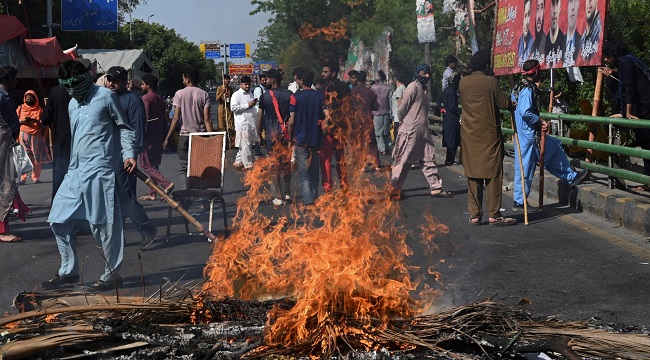Since being ousted from office by a vote of no confidence last year, former Pakistan prime minister Imran Khan has vowed he will captain the country a second time.
But on Tuesday, the one-time international cricket star was arrested as he appeared at Islamabad High Court to face one of a slew of cases levelled against him.
Since he was turfed out, 70-year-old Khan had successfully dodged detention and fought off dozens of charges which analysts say are a common tactic to quash dissent in Pakistan.
He also survived a November assassination attempt which saw him shot in the leg — an attack he blamed on incumbent Prime Minister Shehbaz Sharif and a senior army officer.
The political drama has played out against a backdrop of economic freefall and dramatically increasing militant attacks, ahead of general elections due no later than October.
With the charismatic Khan now locked away and his legion of supporters being called out on the streets to violent protests, his political prospects — and those of Pakistan — are unclear.
– Popular support –
Khan enjoyed genuine popular support when he became premier in 2018, but critics say he failed to deliver on promises to revitalise the economy and improve the plight of the poor.
His Pakistan Tehreek-e-Insaf (PTI) party was voted in by millions who grew up watching him play cricket, where he excelled as an all-rounder and led the nation to World Cup victory in 1992.
PTI overturned decades of dominance by the Pakistan Peoples Party and Pakistan Muslim League-N — two usually feuding groups that joined forces to oust him in April 2022.
Khan’s vision was for Pakistan to become a welfare state modelled on the Islamic golden age of the seventh to 14th centuries, a period of cultural, economic and scientific flourishing in the Muslim world.
But he made little headway in improving Pakistan’s financial situation, with galloping inflation, crippling debt and a feeble rupee undermining economic reform.
A deteriorating security situation, particularly since the Taliban returned to power in Afghanistan in 2021, also happened on his watch.
– Tiptoed into politics –
The Oxford-educated son of a wealthy Lahore family, Khan had a reputation as a playboy until his retirement from international cricket.
For years he busied himself with charity projects, raising millions to build a cancer hospital to honour his mother.
He tiptoed into politics and for years held the PTI’s only parliamentary seat.
But the party grew hugely during the military-led government of General Pervez Musharraf, becoming a genuine force in the 2013 elections before winning a majority five years later.
Running the country proved more difficult than sitting in opposition, however.
Double-digit inflation drove up the cost of basic goods, and Pakistan had to borrow heavily just to service foreign debt. Khan also fell out with the military — key to political power in Pakistan.
Married three times, his current wife Bushra Bibi comes from a conservative family and wears a veil in public.
Often described as being impulsive and brash, Khan draws frequently on cricket analogies to describe his political battles.
“I fight till the very last ball,” he said in one TV interview.

